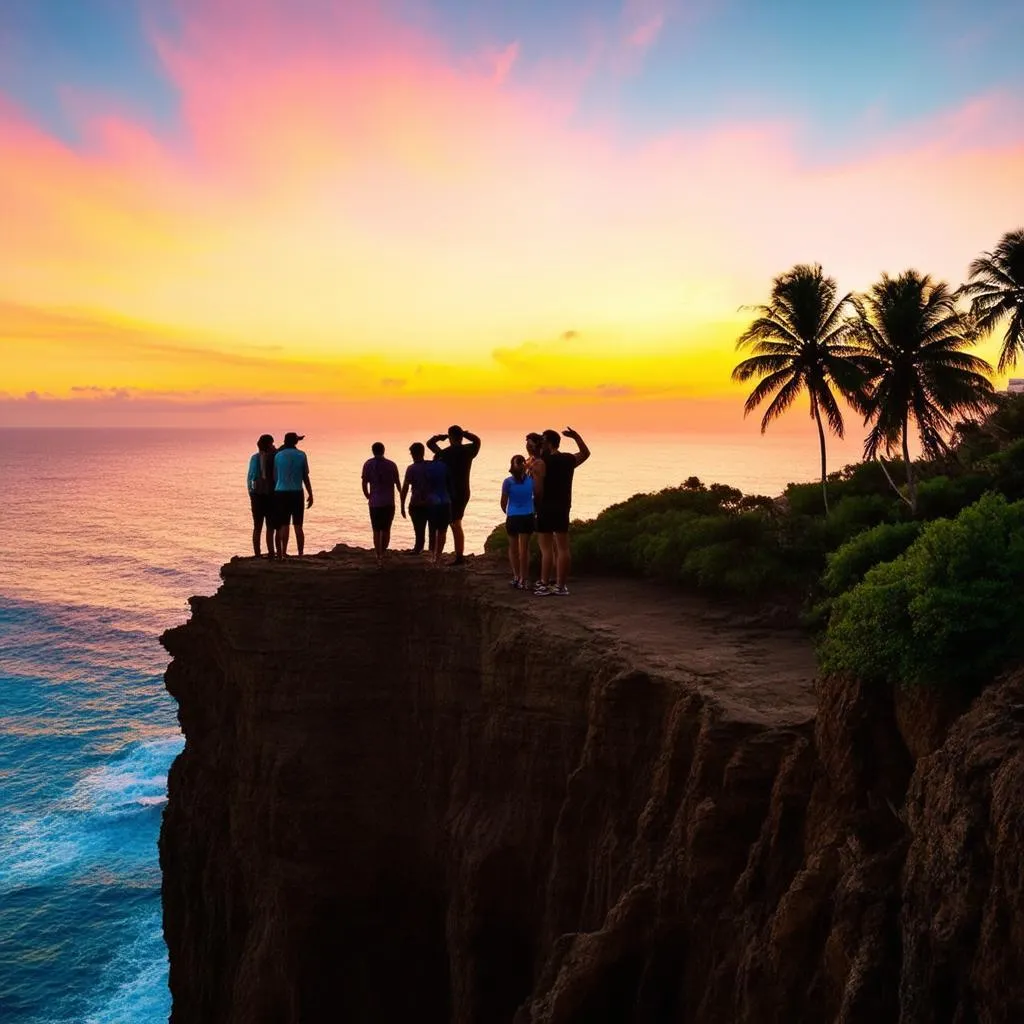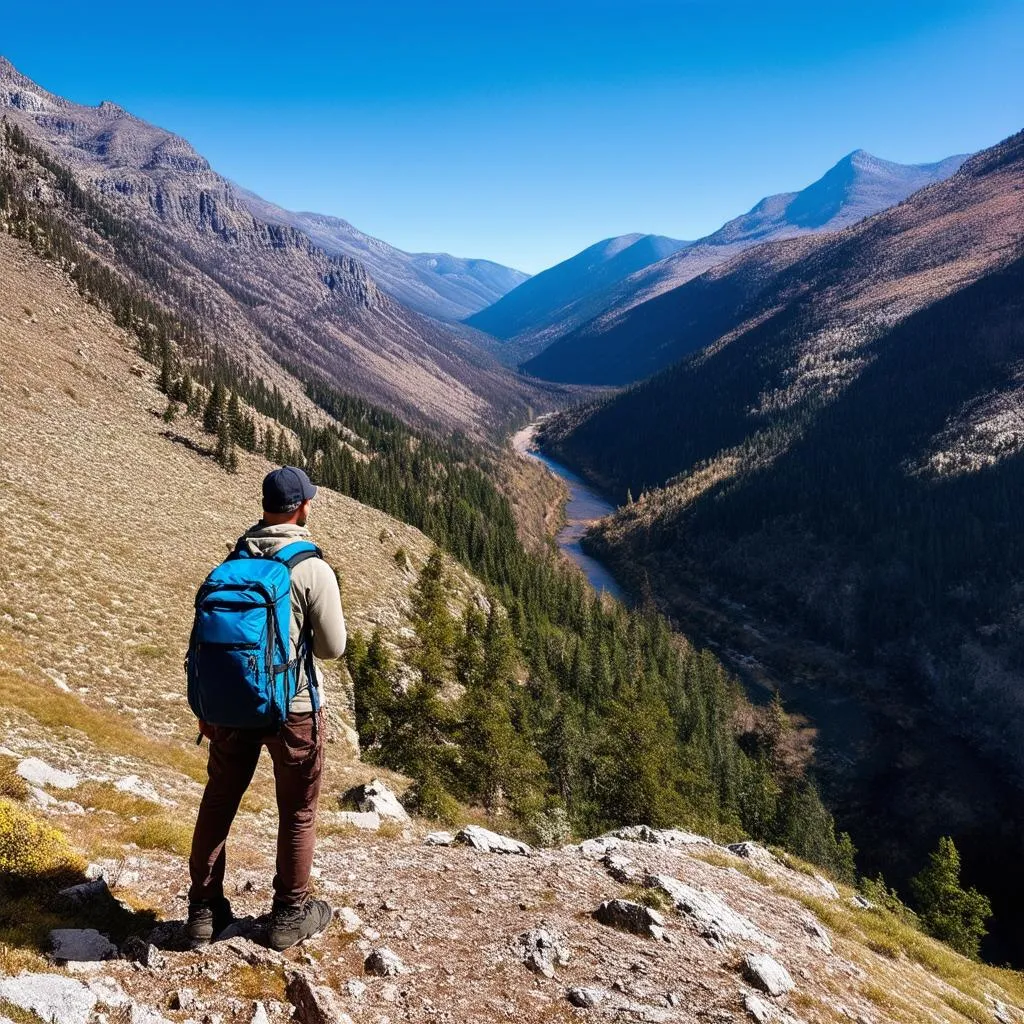“The world is a book and those who do not travel read only one page.” – Saint Augustine.
Travel, in its many forms, has always held a certain allure. Whether it’s the thrill of exploring ancient ruins in Rome, the serenity of watching the sun rise over the Himalayas, or simply the joy of experiencing a new culture in the bustling streets of Hanoi, travel enriches our lives immeasurably. This inherent human desire to explore is what fuels the ever-evolving tourism industry, an industry brimming with opportunities and yet not without its share of hurdles.
A World of Opportunities: Unveiling the Advantages of Tourism
The positive impact of tourism extends far beyond just the joy it brings to travelers. It’s a powerful catalyst for economic growth, cultural exchange, and environmental awareness.
Economic Empowerment
Tourism is a major economic driver, injecting revenue into local communities and bolstering national economies.
- Job Creation: From bustling restaurants in Paris to cozy guesthouses in Hoi An, tourism creates a diverse range of jobs. According to the World Travel & Tourism Council (WTTC), the industry supported over 330 million jobs globally in 2019.
- Infrastructure Development: The influx of tourists often leads to improved infrastructure, including better roads, transportation networks, and communication facilities. Think of the transformation of once sleepy coastal towns into vibrant tourist destinations.
- Boosting Local Businesses: Tourism provides a vital lifeline to local businesses, from souvenir shops in Marrakech to traditional weaving cooperatives in the Andes.
A Bridge Between Cultures
“Travel is fatal to prejudice, bigotry, and narrow-mindedness,” Mark Twain famously said. Tourism fosters cross-cultural understanding and breaks down barriers.
- Promoting Tolerance and Respect: By interacting with people from different backgrounds and experiencing diverse cultures firsthand, travelers develop empathy and a broader worldview. Imagine sharing a meal with a local family in Tuscany or learning a traditional dance in Bali – experiences that foster genuine connection.
- Preserving Cultural Heritage: Tourism can play a crucial role in preserving cultural heritage sites and traditions. Revenue generated from tourism often funds the restoration and maintenance of historical landmarks, from Angkor Wat in Cambodia to Machu Picchu in Peru.
A Catalyst for Conservation
While often perceived as a threat to the environment, responsible tourism can be a powerful force for conservation.
- Promoting Sustainable Practices: The rise of eco-tourism highlights the importance of sustainable travel practices. Lodges powered by renewable energy in Costa Rica, wildlife safaris that prioritize animal welfare in Botswana, and community-based tourism initiatives in Nepal are just a few examples.
- Funding Conservation Efforts: Entrance fees to national parks and protected areas often contribute directly to conservation efforts. This funding helps protect endangered species, preserve fragile ecosystems, and raise awareness about environmental issues.
 tourists enjoying sunset
tourists enjoying sunset
Navigating the Challenges: Addressing the Concerns of Tourism
While the benefits of tourism are undeniable, it’s crucial to acknowledge and address the challenges that come with it.
Environmental Impact
Uncontrolled tourism can strain natural resources and damage fragile ecosystems.
- Overcrowding and Pollution: Popular destinations like Venice, Barcelona, and Ha Long Bay face the pressures of overtourism, leading to environmental degradation and strain on local infrastructure.
- Resource Depletion: The high demand for water, energy, and food in tourist hotspots can deplete local resources and contribute to climate change.
Cultural Commodification
The desire to cater to tourists can sometimes lead to the commodification of culture, diluting its authenticity.
- Loss of Authenticity: The pressure to create “instagrammable” experiences can result in the commercialization of cultural traditions, transforming them into mere performances for tourists.
- Erosion of Local Values: The influx of tourists can sometimes clash with local customs and values, leading to social tensions.
Economic Inequality
While tourism can boost local economies, the benefits are not always distributed equitably.
- Leakage of Revenue: Profits from tourism often leak out of the local economy, benefiting large corporations rather than local communities.
- Seasonal Employment: Tourism-related jobs are often seasonal, leaving many workers vulnerable to economic instability.
 overtourism
overtourism
Charting a Sustainable Path: The Future of Tourism
The key to unlocking the full potential of tourism lies in embracing sustainable practices that benefit both travelers and host communities.
Responsible Travel Choices
Travelers have the power to shape the future of tourism by making conscious choices:
- Support Local Businesses: Choose locally owned accommodations, dine at family-run restaurants, and purchase souvenirs directly from artisans.
- Minimize Environmental Impact: Pack light, use reusable water bottles, opt for eco-friendly transportation options, and be mindful of your waste.
- Engage Respectfully with Local Cultures: Learn a few basic phrases in the local language, respect local customs and traditions, and avoid intrusive photography.
Collaboration and Innovation
Governments, businesses, and communities must work together to create a more sustainable tourism industry:
- Implementing Sustainable Policies: Governments can promote responsible tourism through policies that encourage eco-friendly practices, limit visitor numbers to fragile destinations, and ensure fair labor practices.
- Investing in Sustainable Infrastructure: Developing eco-friendly accommodations, promoting renewable energy sources, and investing in sustainable transportation systems are essential for minimizing the environmental footprint of tourism.
- Empowering Local Communities: Supporting community-based tourism initiatives, providing training opportunities for locals, and ensuring that tourism revenue benefits local communities are crucial for equitable and sustainable tourism development.
Frequently Asked Questions About the Tourism Industry
- Q: What are some examples of sustainable tourism practices?
- A: Staying in eco-lodges, participating in community-based tourism projects, respecting local customs, and minimizing your environmental impact by reducing waste and conserving resources.
- Q: How can I find out if a tour operator is ethical and sustainable?
- A: Look for certifications like those offered by the Global Sustainable Tourism Council (GSTC) or research the operator’s commitment to responsible tourism practices on their website.
- Q: What are some ways to travel on a budget while still being a responsible tourist?
- A: Consider staying in locally owned guesthouses or hostels, eating at local eateries, using public transportation, and packing light to avoid baggage fees.
- Q: How can I support local communities while traveling?
- A: Buy souvenirs directly from artisans, participate in workshops or cooking classes offered by locals, and consider volunteering your time to support community projects.
Travelcar.edu.vn: Your Guide to Responsible Travel
At travelcar.edu.vn, we believe in the power of travel to inspire, educate, and foster positive change. We’re committed to providing you with the resources and information you need to plan your next adventure responsibly. Explore our website to discover sustainable travel tips, eco-friendly accommodations, and authentic cultural experiences.
 travel inspiration
travel inspiration
The future of tourism lies in finding a harmonious balance between the economic benefits of travel and the preservation of our planet’s natural and cultural treasures. By embracing responsible tourism practices, we can ensure that future generations will continue to be inspired by the wonders of travel.